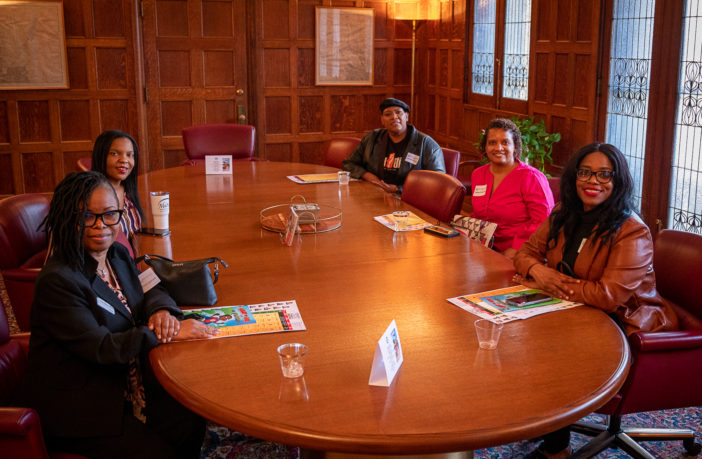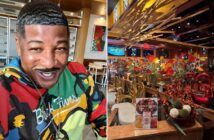By Megan Sayles,
AFRO Business Writer,
msayles@afro.com
The AFRO held its third annual Black Business Matters Expo on April 27 at the media company’s headquarters in Downtown Baltimore.
In-person attendees were joined at the event by more than 1,700 virtual participants, who all received information from a dynamic array of wealth coaches, c-suite executives and business advisors. The expo ran under the theme, “The Great Divide: Work, Wages and Wealth,” and included messages from elected officials and faith leaders.
“Black businesses matter not just during a particular month, day or event. Black businesses matter all of the time,” said Frances “Toni” Draper, publisher of the AFRO. “Let’s support one another. Let’s create some Black millionaires and billionaires. Let’s teach our young people about the importance of entrepreneurship and financial literacy.”
Individuals virtually attended the Black Business Matters expo by entering a digital word designed by Tyrone Taborn’s metaverse platform, STEM City USA.
The programming took place across four stages: the “Closing the Divide” stage, two “Work and Wages” stages and the “Wealth Empowerment” stage. The event offered two programmatic tracks to meet business owners where they are in their entrepreneurial journeys.
Carl Brown and Stacey Palmer of the D.C. Small Business Development Center hand out financial literacy resources for all ages at the expo.  Former Baltimore City Mayor Catherine Pugh with Destiny Simone Ramjohn and AFRO Director of Community and Public Relations, Diane Hocker.
Former Baltimore City Mayor Catherine Pugh with Destiny Simone Ramjohn and AFRO Director of Community and Public Relations, Diane Hocker. Denise Johnson of PNC (front left), with Brandy Ray (back left), Keichel Lewter (front right), Tanya Pritchett (middle right) and Rosalind Halsey.
Denise Johnson of PNC (front left), with Brandy Ray (back left), Keichel Lewter (front right), Tanya Pritchett (middle right) and Rosalind Halsey.  AFRO Executive Director Lenora Howze with Ramsey Harris, market manager for community development banking in Greater Maryland at PNC Bank.
AFRO Executive Director Lenora Howze with Ramsey Harris, market manager for community development banking in Greater Maryland at PNC Bank. Event planner Nicole Kirby (left), founder and CGO of CarVer Communications, with Anthony Stewart, president at Stewart Financial Services, Linda Macklin and Eugene Mitchell.
Event planner Nicole Kirby (left), founder and CGO of CarVer Communications, with Anthony Stewart, president at Stewart Financial Services, Linda Macklin and Eugene Mitchell.  Renee Beck and Katie Truitt, from United Way, at the expo asking attendees to step into the shoes of a low-income resident with the 30/30 Experience. The virtual resource requires participants to make tough decisions based on proposed scenarios, such as how to deal with family birthdays and special occasions when bills are piling up.
Renee Beck and Katie Truitt, from United Way, at the expo asking attendees to step into the shoes of a low-income resident with the 30/30 Experience. The virtual resource requires participants to make tough decisions based on proposed scenarios, such as how to deal with family birthdays and special occasions when bills are piling up.
The Emerging Track served entrepreneurs who were in the early growth stage and seeking resources and capital to build their businesses. The Accelerator Track supported seasoned entrepreneurs with planning for their long-term financial goals.
Speakers discussed business topics, including obtaining capital, creating generational wealth, work-life balance and economic inclusion.
One speaker, Cedric Nash, highlighted how investing and accumulating assets is integral to wealth creation in the Black community.
“The racial wealth gap is serious. We as a community need to get busy closing, and the key to that is buying assets,” said Nash, founder of the Black Wealth Summit.
The Morgan State University Choir and Baltimore-born R and B singer, Gabby Samone, also performed during the event.
The Black Business Matters Expo sponsors included AARP, the American Classic Agency, Associated Black Charities, CareFirst, Comcast, the D.C. Small Business Development Center, JPMorgan Chase, PNC, United Way, Maryland Technology Development Corporation and Wells Fargo.
Many of the sponsors participated in the expo’s live segments.
“The reason why it was so very important for us to partner with our beloved friends at the AFRO is because we recognize that we’re going to build generational wealth and bridge the racial wealth gap through two primary ways: homeownership and entrepreneurship,” said Ramsey Harris, senior vice president and Greater Maryland community development banking market manager at PNC.
“At PNC, we are very committed to ensuring that Black-owned businesses and Brown-owned businesses have the tools, resources and access to capital that they need to enjoy longevity in entrepreneurship.”
Harris, who hails from Baltimore’s Edmondson Village, pointed out that many small businesses fail within the first two years of opening their doors, and a large percentage of those businesses are Black-owned.
“At PNC, we’re strategically putting our resources together to be proactive in ensuring that going forward Black enterprises are positioned to survive and thrive,” said Harris.
Megan Sayles is a Report for America Corps member.



